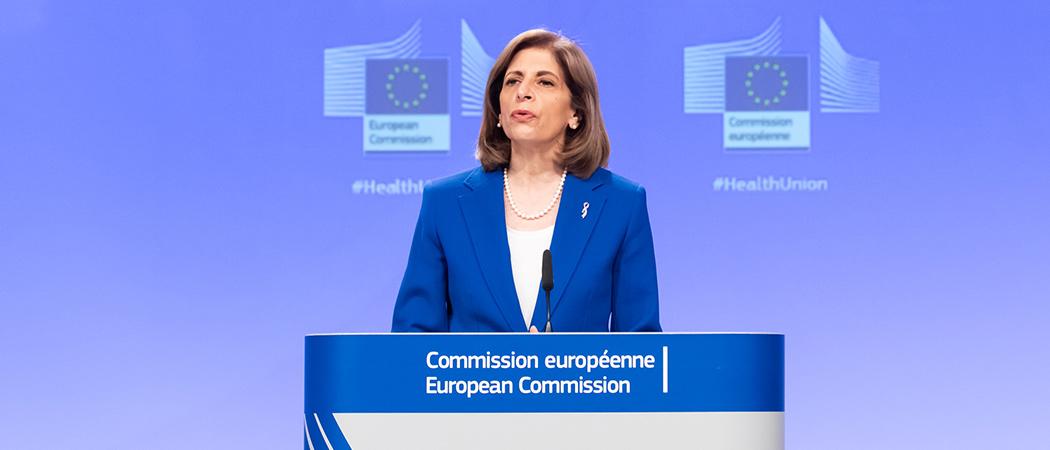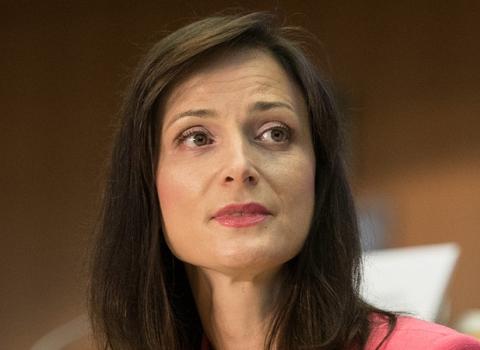The EU succeeded in creating a portfolio of vaccines and procuring enough doses to go round, but contracts did not make provisions for disruptions to supplies

Stella Kyriakides, European Commissioner. Photo: European Union / Aurore Martignoni
The EU’s tailor-made centralised system for vaccine procurement succeeded in creating a diversified portfolio of vaccine candidates and in buying sufficient doses of COVID-19 vaccines.
However, the EU started procurement later than the UK and the US, and when severe supply shortfalls occurred in the first half of 2021, it became clear that most contracts signed by the European Commission did not include specific provisions to address these disruptions.
These shortcomings have not been sufficiently assessed, according to a report published today by the European Court of Auditors (ECA). The Commission has not yet scrutinised or benchmarked the procurement process to draw lessons for the future, nor does it currently plan to test its pandemic procurement system through stress-tests or simulations.
“Whether the Commission and member states have procured COVID-19 vaccines effectively is a very pertinent question,” said Joëlle Elvinger, the ECA member who led the audit. “We chose this topic given the central role that vaccines played in the response to the COVID-19 pandemic, the unprecedented nature of the EU’s involvement in vaccine procurement and the expenditure involved. Our findings are intended to contribute to the ongoing development of the EU’s pandemic preparedness and response capabilities.”
In its defence, the Commission says that working together with member states, it secured the broadest portfolio of vaccines in the world and was able to ensure all member states, irrespective of their size, received them at the same time.
Between December 2020 and March 2021, four COVID-19 vaccines received a conditional marketing authorisation for use in the EU. Although some countries were slightly faster at the beginning vaccine rollout because they operated in a different legal context, the EU “achieved this success while remaining open to the world by sharing vaccines” and by the end of August 2021, the Commission met its target of having 70% of the EU adult population fully vaccinated.
The scale of achievement should not be underestimated, given that when the EU’s vaccine procurement process started in mid-2020, it was not known if or when a COVID-19 vaccine would reach the market. The EU had to act ahead of clear scientific data on vaccine candidates’ safety and efficacy, and therefore chose to back a range of candidates to create an initial portfolio of different vaccine technologies and manufacturers.
By November 2021, the Commission had signed €71 billion worth of contracts on behalf of the member states to purchase up to 4.6 billion COVID-19 vaccine doses.
Most of these are advance purchase agreements in which the Commission shares the development risk of a vaccine with the manufacturer and supports the setting up of commercial scale production capacity through upfront payments from the EU budget.
Centralised procurement unprecedented, but followed EU rules
Although the size of the contracts and the centralised procurement were unprecedented, the negotiations followed a process laid down in the EU’s financial regulation. But at the heart of this, the preliminary negotiations actually took place before a tender invitation was sent out.
By the end of the summer of 2021, the EU had secured sufficient doses to vaccinate at least 70 % of the adult population, after experiencing supply shortfalls from two manufacturers in the first half of 2021.
The Commission could, and in one case did, take manufacturers to court. According to the auditors, however, the EU’s negotiators did not fully analyse the production and supply chain challenges of vaccine production until after signing most of the contracts. The terms of the contracts evolved over time, and those signed in 2021 have stronger provisions on key issues such as delivery schedules and production location than those signed in 2020.
The terms negotiated are different for each contract, though each one adheres to the principles of the Product Liability directive. Member states agreed to reduce manufacturers’ risks liability for adverse effects.
The provisions in the contracts concluded with COVID-19 vaccine manufacturers differ from pre-pandemic practice, because member states have taken over some of the financial risks normally assumed by vaccine manufacturers.
The Commission has proposed to use the process set up for COVID-19 for any future health crises, but neither the Commission’s nor the EU Council’s ‘lessons learned’ reports on the COVID-19 pandemic examined the performance of the vaccine procurement process, other than to look at the overall outcome, the auditors say.
The ECA is recommending that specific procurement guidelines should be drawn up on the basis of lessons learnt with COVID-19 and that the EU’s medical countermeasures procurement process should be stress-tested in order to be better equipped if needed in future





 A unique international forum for public research organisations and companies to connect their external engagement with strategic interests around their R&D system.
A unique international forum for public research organisations and companies to connect their external engagement with strategic interests around their R&D system.